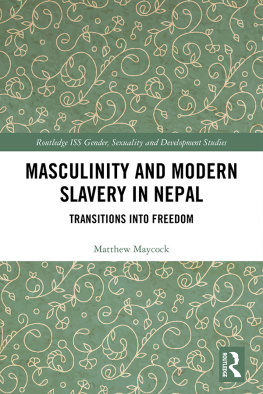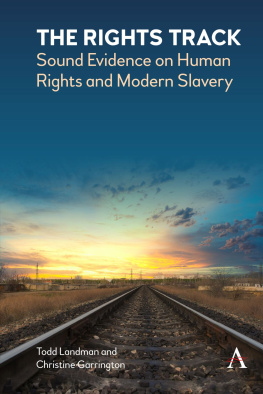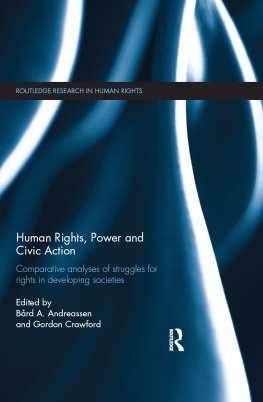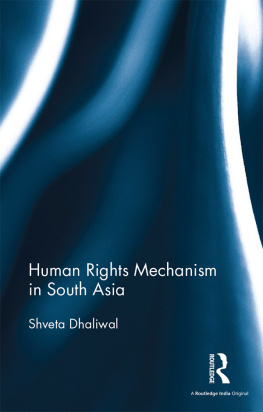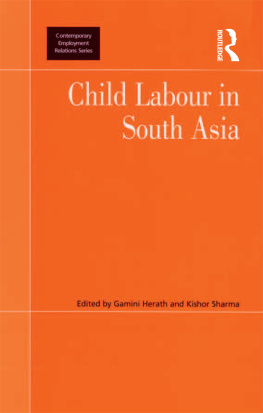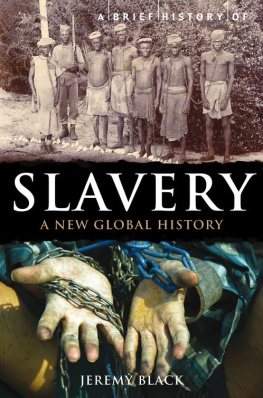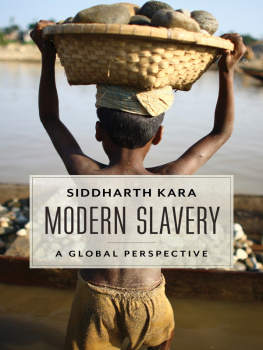
Modern Slavery and Bonded Labour in South Asia
This book investigates one of the most pervasive forms of modern slavery: bonded labour, whereby labour is linked with a credit agreement, leaving a debtor bound to repay their debt through long-term servitude. Drawing on cases from Nepal and India, the author adopts a human rights-based approach, interpreting slavery as a violation of human rights, and focusing on the empowerment of slaves as rights holders. Ultimately the book aims to explore the links between rights, power inequality and oppression, and to uncover ways to achieve the full liberation of bonded labourers.
Identifying the factors and forces that contribute to and reinforce the situation of bonded labour in South Asia, the book demonstrates how systems of bonded labour are connected to long-term processes of colonisation, dispossession, migration, nationalisation of natural resources, and the introduction of private land ownership. Despite the fact that the United Nations has reported debt bondage as the most prevalent form of forced labour worldwide, there it is still little known about the real practical impacts of this approach to the lives of marginalised people.
Based on extensive ethnographic research, this book will be a useful guide to students and scholars of modern slavery, international development, and South Asian studies.
Elena Samonova completed her PhD at the University of Helsinki, Finland. She is currently a post-doctoral fellow at University College Dublin, Ireland.
Routledge Research on Asian Development
Development and Gender Capital in India
Change, Continuity and Conflict in Kerala
Shoba Arun
Bangladeshs Graduation from the Least Developed Countries Group
Pitfalls and Promises
Edited by Debapriya Bhattacharya
Regional Cooperation for Peace and Development
Japan and South Korea in Southeast Asia
Edited by Brendan Howe
Child and Youth Well-being in China
Lijun Chen, Dali L. Yang, Di Zhou, and Qiang Ren
Modern Slavery and Bonded Labour in South Asia
A Human Rights-Based Approach
Elena Samonova
Modern Slavery and Bonded Labour in South Asia
A Human Rights-Based Approach
Elena Samonova
First published 2019
by Routledge
2 Park Square, Milton Park, Abingdon, Oxon OX14 4RN
and by Routledge
52 Vanderbilt Avenue, New York, NY 10017
Routledge is an imprint of the Taylor & Francis Group, an informa business
2019 Elena Samonova
The right of Elena Samonova to be identified as author of this work has been asserted by her in accordance with sections 77 and 78 of the Copyright, Designs and Patents Act 1988.
All rights reserved. No part of this book may be reprinted or reproduced or utilised in any form or by any electronic, mechanical, or other means, now known or hereafter invented, including photocopying and recording, or in any information storage or retrieval system, without permission in writing from the publishers.
Trademark notice: Product or corporate names may be trademarks or registered trademarks, and are used only for identification and explanation without intent to infringe.
British Library Cataloguing-in-Publication Data
A catalogue record for this book is available from the British Library
Library of Congress Cataloging-in-Publication Data
Names: Samonova, Elena, author.
Title: Modern slavery and bonded labour in South Asia : a human rights-based approach / Elena Samonova.
Description: Abingdon, Oxon ; New York, NY : Routledge, 2019. | Series: Routledge research on Asian development ; 5 | Includes index.
Identifiers: LCCN 2018058932 (print) | LCCN 2019001580 (ebook) | ISBN 9780429054952 (eBook) | ISBN 9780367150921 (hardback)
Subjects: LCSH: SlaverySouth Asia. | PeonageSouth Asia. | Human rightsSouth Asia.
Classification: LCC HT1240.5 (ebook) | LCC HT1240.5 .S26 2019 (print) | DDC 306.3/620954dc23
LC record available at https://lccn.loc.gov/2018058932
ISBN: 978-0-367-15092-1 (hbk)
ISBN: 978-0-429-05495-2 (ebk)
Typeset in Times New Roman
by Wearset Ltd, Boldon, Tyne and Wear
Contents
I would like to thank the various people who helped me to carry out my project till the end. I am particularly grateful for Professor Barry Gills and Doctor Lauri Siitonen, who have always been ready to give me advice and provided constructive comments on my work. My research is based on the data collected during field work; that is why I want to express my great appreciation to the people who helped me to collect and translate the data. First of all, I want to thank all the (ex)bonded labourers who shared their stories with me. I cannot give their real names, but I am very grateful that I had a chance to meet these people and to learn from them. This research would never have been possible without the cooperation of the staff of NGOs working with Indian and Nepali bonded labourers; that is why I wish to offer my special thanks to them.
A special thankyou is also due to my interpreters Chiring Lama, Naisha Choudhary, and Sandesh Ghimire. It wouldnt be an overestimation to say that without their help this research could not exist in its current form. I am very grateful for the assistance given by Father Martin Joseph, Father Stanislas Bandanadam, and the staff of Gwalior Catholic Sewa Samaj, who helped me to assess the field in Madhya Pradesh. I would like to thank Nardev Pandey and his family for the assistance and accommodation they provided me during my stay in Kathmandu. My grateful thanks are also extended to Ram Humagai, who gave me valuable practical advice in Nepal.
I also would like to thank Professor Sharma and Dr. Gurin, my pre-examiners, for their constructive critique, which helped me to improve my thesis. My special thanks go to Dr. Christine Molfenter and Prof. Kevin Bales for their comments on my work.
This research could not have been realised without financial support and I would like to express my sincere thanks to Ryoichi Sasakawa Young Leaders Fellowship Foundation (SYLFF) and the University of Helsinki for the grants I received over the years of my research.
Finally, I would like to thank my family, who never doubted that I could finish this project.
| AAI | ActionAid India |
| AAN | ActionAid Nepal |
| ACF | Action Against Hunger |
| BASE | Backward Society Education |
| BfC | Books for Change |
| BS | Bikram Sambat (official calendar in Nepal, about 5657 years ahead of Gregorian calendar, for example, year 2018 is 20742075 in Nepal) |
| CEDAW | Convention on the Elimination of All Forms of Discrimination Against Women |
| CPN-UML | Communist Party of Nepal (United Marxist-Leninist) |
| CPRC | Chronic Poverty Research Center |
| CRC | Convention on Childrens Rights |


